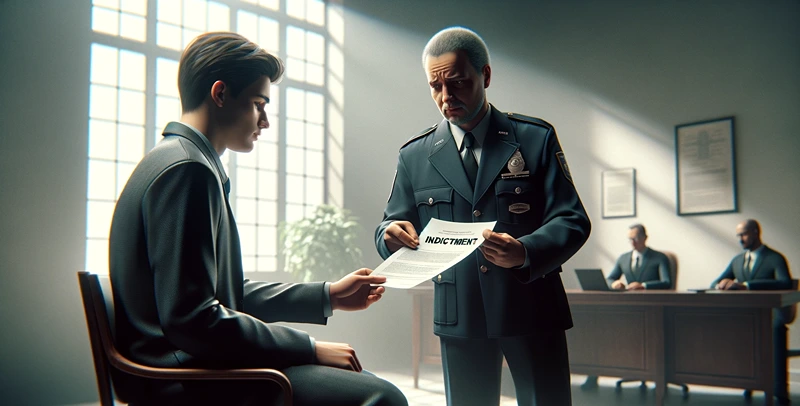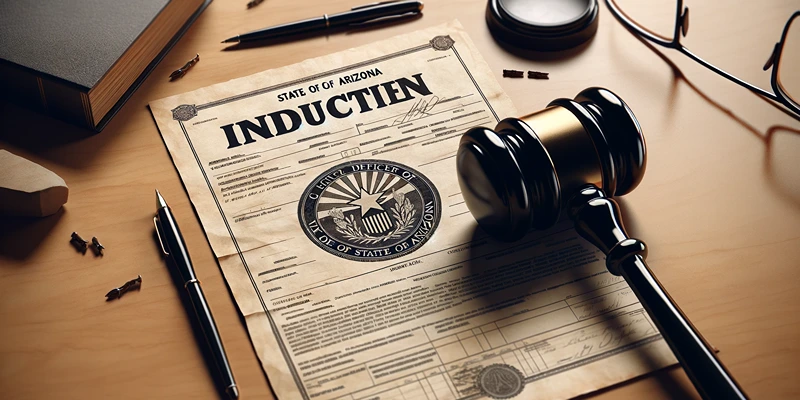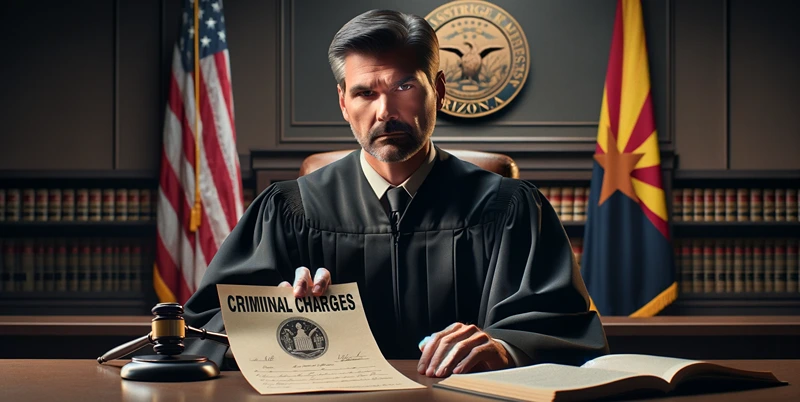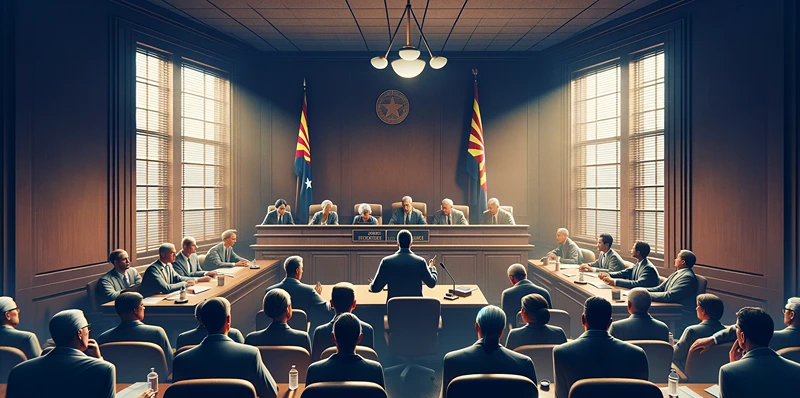How Does a Criminal Indictment Work in Arizona Law

This article discusses the following:
Being indicted means you are formally accused of a crime; however, it is not an immediate assumption of your guilt or a direct path to jail.
In this situation, a criminal defense attorney can be invaluable. They not only offer legal advice but also work to formulate a strong defense on your behalf. Kolsrud Law Offices can provide the necessary legal support, aiming to clarify the charges against you and develop a strategy aimed at preserving your freedom and rights.

What is a Criminal Indictment
A criminal indictment, issued after a grand jury proceeding in AZ, marks a significant stage in the state’s criminal prosecution process.
It is a formal accusation that a criminal offense has been committed, typically leading to the defendant's first court appearance. Here, the accused will hear the criminal charges against them and have the opportunity to enter a plea.
The Nine Stages of a Criminal Case
Understanding the sequence and significance of each stage in a criminal case can demystify the process and alleviate some of the stress associated with criminal proceedings. Here, we explore each stage in detail:
Investigation and Arrest
The criminal justice process typically begins with an investigation, which may involve gathering evidence, interviewing witnesses, and conducting searches. This stage is crucial as it forms the basis of the potential criminal case. If law enforcement believes there is sufficient evidence, the suspect can be arrested. An arrest is made based on probable cause, meaning there is a reasonable basis to believe that a crime has been committed and that the suspect is responsible.
Initial Appearance and Bail
Following an arrest, the accused must be brought before a judge for an initial appearance, usually within 24 hours. During this hearing, the judge will inform the accused of their rights and the charges against them. Bail may be set during this time, which is the amount of money that must be posted for the accused to be released from jail while awaiting trial. The conditions of release and bail amount depend on factors like the severity of the crime, the defendant's criminal history, and flight risk.
Preliminary Hearing/Grand Jury Proceedings
This stage is where the court determines whether there is enough evidence to charge the defendant formally. In a preliminary hearing, the judge decides if there is probable cause to believe that a crime was committed and that the defendant committed it. Alternatively, a grand jury may be convened to review the evidence. If the grand jury issues an indictment, the case moves forward. If not, the charges may be dismissed.
Arraignment and Plea
At the arraignment, the defendant is formally charged and asked to enter a plea: guilty, not guilty, or no contest. This stage sets the course for the subsequent legal process. If the defendant pleads not guilty, the case will proceed to trial. A guilty or no contest plea may lead to sentencing.
Pre-Trial Motions and Hearings
Before the trial, both sides can file motions to resolve various legal questions. These might include motions to dismiss the case, suppress evidence, or determine other legal issues. These hearings allow the court to address procedural and substantive issues before the trial begins.
Trial
During the trial, the prosecutor must prove the defendant's guilt beyond a reasonable doubt. Both the prosecution and defense have the opportunity to present evidence, call witnesses, and cross-examine the other side's witnesses. The trial can be before a jury or a judge alone (bench trial).
Post-Trial Motions and Sentencing
If the defendant is convicted, the case moves to sentencing. The judge will determine the appropriate punishment based on factors such as the nature of the crime and the defendant’s background. Before sentencing, the defense can file post-trial motions, potentially requesting a new trial or an acquittal despite the jury's verdict.
Appeals
The defendant has the right to appeal the conviction or sentence if they believe a legal error has affected the trial's outcome. The appellate court reviews the case for legal mistakes and may affirm the original decision, reverse it, or remand the case back to the lower court for further proceedings.
Post-Conviction Relief
Even after the appeals process, defendants have some options available, such as filing for post-conviction relief, which can include arguing for a new trial based on new evidence or violations of constitutional rights.

Is an Indictment the Same Thing as Criminal Charges?
It's common to confuse these terms, but they refer to different aspects of the legal process. An indictment is the method by which someone is formally charged with a crime, typically for felonies.
This does not imply guilt but moves the case into the courtroom. Criminal charges, however, can be brought through various means, not just by indictment, and signify that formal legal proceedings have been initiated against the accused.
Contact us today to schedule a
FREE CONSULTATION and learn
how we can help you.
Can I Be Indicted Without Being Arrested First?
Yes, individuals can be indicted without first being arrested. This situation may occur in cases where a crime is complex and requires extensive investigation, such as white-collar crimes or cases involving large-scale fraud. Additionally, if authorities believe arresting a suspect could compromise an ongoing investigation or if the suspect is not currently in the jurisdiction, they may opt for indictment before arrest.

How do Grand Jury Proceedings Work
A grand jury is a legal body empowered to conduct official proceedings to investigate potential criminal conduct. In Arizona, grand juries consist of citizens summoned from the community, similar to jury duty in a trial.
However, grand juries are larger, typically comprising between 12 and 23 members, depending on the jurisdiction. The grand jury's role is to examine evidence presented by the prosecution to determine whether there is probable cause to believe a crime has been committed.
➤The Grand Jury Process
The proceedings begin with the selection of grand jurors, who are then sworn in and instructed on their duties and the legal standards to be applied. Unlike regular trials, these proceedings are secretive; only the jurors, the prosecutors, necessary court personnel, and witnesses giving testimony are present. This secrecy serves to protect the accused's reputation should the grand jury decide not to indict and ensures the safety and impartiality of the jurors.
During the proceedings, prosecutors present their case to the grand jury, including evidence and witness testimonies. The grand jurors are allowed to ask questions and request additional information. It's important to note that the accused and their legal representatives are typically not present during these proceedings, and there is no judge overseeing the process.
➤The Role of the Grand Jury
The grand jury's role is not to determine guilt or innocence but rather to decide whether there is enough evidence to charge someone with a crime. This is known as establishing "probable cause." The standard of proof is lower than in a trial, where the prosecution must establish guilt "beyond a reasonable doubt."
➤Decision and Aftermath
After reviewing the evidence, the grand jury votes on whether to issue an indictment. If a majority agrees there is probable cause, an indictment is issued. This does not mean the accused is guilty but rather that there will be a trial to determine guilt or innocence. If the grand jury does not find probable cause, it returns a "no bill," and typically, no charges are filed, although prosecutors may seek a new grand jury or file charges through a different procedure.
Should You Hire a Defense Attorney For a Criminal Indictment
Facing a criminal indictment is a significant event that can have profound effects on your life. It's important to understand why hiring a defense attorney is beneficial under these circumstances. A skilled criminal defense lawyer provides vital support and guidance through the legal process and works to protect your interests.
When you're indicted, you're thrown into a complex system that includes arrest, court appearances, and potentially a trial. A defense attorney helps you through these stages, ensuring your rights are maintained and giving advice on important decisions like whether to go to trial or accept a plea deal.
An experienced attorney will examine the evidence against you, identify any procedural mistakes or violations of your rights, and discuss with the prosecutor to possibly reduce or dismiss charges. Their knowledge is particularly important when dealing with the intricacies of criminal law, possible defenses, and the consequences of different pleas or outcomes.
The consequences of a criminal case can reach far beyond the courtroom, impacting your personal life, job, and future prospects. An attorney aims to reduce these effects, working towards outcomes that best serve your long-term interests. They use their knowledge and negotiation skills to fight for a favorable outcome, whether that means pushing for a not guilty verdict, securing lesser charges, or achieving a lighter sentence.
Contact Kolsrud Law Offices
Josh Kolsrud and his team specialize in criminal defense, offering services like legal representation and advice for those facing criminal indictments. They work to understand the specifics of each case, aiming to provide tailored defense strategies. By analyzing evidence and legal parameters, they strive to achieve the best possible outcomes for their clients.
For detailed information on how they can assist with a criminal indictment, contact Kolsrud Law Offices, you can call them for a free consultation at (602) 638-3790. or email Josh at Josh@KolsrudLawOffices.com.
An award-winning criminal defense attorney Since 2006
Why Choose Josh Kolsrud
With over 100 jury trials to his name, and years of experience as a state and federal prosecutor, Josh understands the law, the legal process, and your rights. Josh is also committed to representing every client with utmost integrity and dedication
Experience
Josh has prosecuted major crimes on the state and federal level, led a successful anti-human sex trafficking operation that saved lives, and argued before countless juries and justices for his clients
Expertise
Josh is an expert in both Arizona and federal criminal law, and is ready to put that expertise to work for you.
Dedication
As a prosecutor, Josh saw far too many defendants lose their livelihood due to poor representation. Josh will always give every client his complete attention and effort
Get a Free Initial Consultation:
Complete our form below to get a free case review.
or call us at (480) 999-9444.
